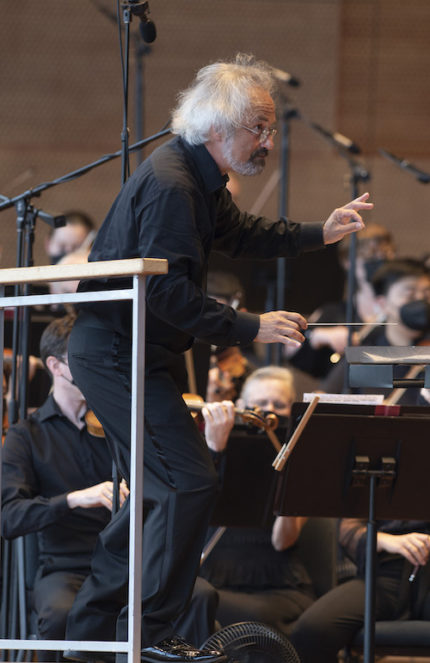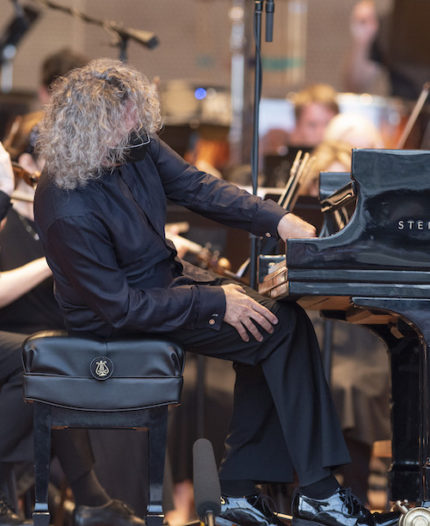Kalmar unearths intriguing rarity in GPO’s kaleidoscopic French program

With only two weeks remaining in the 2022 Grant Park Music Festival season, it’s encouraging to note that neither the energy level of the Grant Park Orchestra, nor the conspicuous commitment of its principal conductor, Carlos Kalmar, have flagged in the summer heat.
It’s also worth noting that the thoughtful programming mix of familiar and unfamiliar music that has long been emblematic of Kalmar’s artistic directorship remains alive and well at the Jay Pritzker Pavilion, Millennium Park. This weekend he is inviting the audience to join him and the orchestra for an unusual exploration of French music.
Only the big closing piece on Friday night’s program, the Berlioz Symphonie fantastique, falls into the category of standard repertoire. The rest consists of a Ravel concerto that does not turn up all that often in concert, prefaced by a genuine Gallic rarity from the late 19th century—Andromède, a neglected tone poem by a woman composer who is only recently emerging from well over a century of obscurity. This performance marked the work’s festival premiere.
Augusta Holmès is her name. Born in Paris in 1847 of Irish parents, she became a naturalized French citizen in 1871. Despite the musical talent she displayed at an early age (she was an excellent pianist and a gifted singer), she was denied entry into the Paris Conservatory and relied on private teachers, including Camille Saint-Saens and Cesar Franck, for her training.
Despite the gender barriers of the time, she enjoyed some successes and became a celebrity in Parisian cultural circles: Her Triumphal Ode, given with 1,200 performers at the 1889 Paris Exhibition, inspired Saint-Saens to call her “France’s Muse.”
Holmès became a well-known advocate of Wagner, not surprisingly since her lover, the poet Catulle Mendes (with whom she had five children), was one of the composer’s greatest champions in France. Her own music shunned salon trifles and what were viewed as stereotypically “female” genres in favor of orchestral music, opera, big choral odes and other forms traditionally considered to be strictly male preserves.
Holmès was hardly a great musical original, but neither was she negligible: Her sense of orchestral color was acute, her juxtaposition of the grandiose and tenderly lyrical knowing. Why her large body of music so utterly faded from view following her death in 1903 remains one of the great mysteries. The best of it is long overdue for revival.
Contemporary critics deemed Holmès’ compositional style “virile” and “masculine”— adjectives that, however sexist they appear to us in these politically correct times, well suit her 1883 symphonic poem based on the myth of Perseus and Andromeda.
The heroic trombone figure that launches Andromède is a bold call-to-attention that recalls the hunting-horn opening of Franck’s tone poem Le chasseur maudit, written a year earlier. Indeed, Franck is the dominant musical influence—from the galloping string figure, laced with harps and brass, that represents Perseus, to the tenderly lyrical music for the love duet of the hero and Andromeda. There is a slow fade to silence in the final pages which may depict the metamorphosis of the lovers into neighboring constellations.
Kalmar on Friday proved himself a persuasive advocate for Holmès’ music and he had his orchestra responding to the score with all due color and urgency.
You would think that Ravel’s Concerto for the Left Hand (commissioned by the one-armed pianist Paul Wittgenstein, who gave the premiere in 1932) would long have been a quasi-staple at Grant Park concerts, but no. The festival didn’t get around to programming it until 1994, when the late, great pianist Leon Fleisher introduced this elegant five-knuckle-buster into the festival repertoire.
Andreas Haefliger, who is assuming the rigorous solo duties at the weekend concerts, proved less formidable in impact on Friday evening, though still worth hearing. Pianism of such technical control, rhythmic dexterity and idiomatic command cannot be discounted, and the probing Swiss pianist admirably sustained the illusion that more than one hand was involved in producing all that sound. Even so, the performance had its rough edges, progressing more in fits and starts than a smoothly realized through-line.

The chief culprits were not so much the performers as the sonic engineers. From my seat near the front of the pavilion, Haefliger’s Steinway grand sounded ill-balanced against the orchestra; important symphonic material emerged as accompaniment to the piano rather than the other way around; too much music was submerged.
Kalmar and company pitched in supportively although coordination between soloist and orchestra wanted tightening, in places. One trusts the problem patches will be ironed out in time for the repeat performance on Saturday.
No such glitches, however, marred the success of Berlioz’s flamboyant manifesto of revolutionary Romanticism. This Fantastic Symphony revealed conductor and orchestra at their most blazingly spontaneous, fully responding to the vigorous episodes yet sensitive to the languorous lyricism of the others. For once the piece felt like more than a mere orchestral showpiece.
After the passionate opening section, its sighing strings vividly conveying the image of the brooding hero, “A Ball” waltzed with a firm yet flexible underlying pulse (the idée fixe was nicely drawn by the melancholy flute and, later, clarinet). A finely controlled evocation of a bucolic countryside got extramusical help from the park’s resident chorus of cicadas. The fourth movement marched to the scaffold with bold, brassy urgency, while the woodwind choir came into its own in a Witches’ Sabbath that was full of spooky atmosphere, right down to the bells ominously tolling the “Dies irae.”
The program will be repeated 7:30 p.m. Saturday at the Pritzker Pavilion. grantparkmusicfestival.com
Posted in Uncategorized




